

DNA Tests Can Take Some of the Guesswork out of Treating Depression. Educated guesses — totally acceptable for trivia nights.
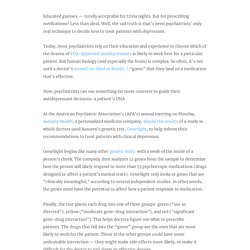
But for prescribing medications? Less than ideal. Well, the sad truth is that’s been psychiatrists’ only real technique to decide how to treat patients with depression. Today, most psychiatrists rely on their education and experience to choose which of the dozens of FDA-approved antidepressants is likely to work best for a particular patient. But human biology (and especially the brain) is complex. Now, psychiatrists can use something far more concrete to guide their antidepressant decisions: a patient’s DNA. At the American Psychiatric Association’s (APA’s) annual meeting on Monday, Assurex Health, a personalized medicine company, shared the results of a study in which doctors used Assurex’s genetic test, GeneSight, to help inform their recommendations to treat patients with clinical depression.
'Gene map for depression' sparks hopes of new generation of treatments. Scientists have raised hopes for more effective treatments for depression, a condition that affects over 300 million people globally, after mapping out the genetic foundations of the mental disorder in unprecedented detail.
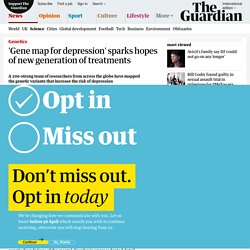
In the world’s largest investigation into the impact of DNA on the mental disorder, more than 200 researchers identified 44 gene variants that raise the risk of depression. Of those, 30 have never been connected to the condition before. By tripling the number of gene regions linked to depression, scientists now hope to understand more about why the disorder strikes some but not others, even when they have similar life experiences. The work could also help in the search for drugs to treat the condition which affects as many as one in four people over a lifetime. Previous work with twins suggests that genetics explains about 40% of depression, with the rest being driven by other biological factors and life experiences.
. … we have a small favour to ask. Antidepressants Don’t Always Work. Now Doctors Can Peer Into The Brain To Get Patients The Right One. For people that take SSRIs (a specific type of antidepressant medication that affects a compound in the brain called serotonin), they are a great, commonly-prescribed treatment for depression.
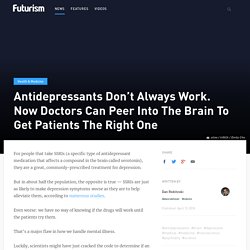
But in about half the population, the opposite is true — SSRIs are just as likely to make depression symptoms worse as they are to help alleviate them, according to numerous studies. Even worse: we have no way of knowing if the drugs will work until the patients try them. Gizmodo. DARPA-funded prosthetic memory system successful in humans, study finds. Hippocampal prosthesis restores memory functions by creating “MIMO” model-based electrical stimulation of the hippocampus — bypassing a damaged brain region (red X).
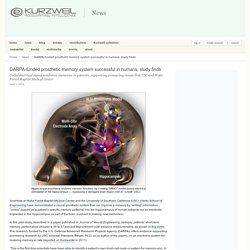
(credit: USC) Scientists at Wake Forest Baptist Medical Center and the University of Southern California (USC) Viterbi School of Engineering have demonstrated a neural prosthetic system that can improve a memory by “writing” information “codes” (based on a patient’s specific memory patterns) into the hippocampus of human subjects via an electrode implanted in the hippocampus (a part of the brain involved in making new memories).
In this pilot study, described in a paper published in Journal of Neural Engineering, epilepsy patients’ short-term memory performance showed a 35 to 37 percent improvement over baseline measurements, as shown in this video. The research, funded by the U.S. Defense Advanced Research Projects Agency (DARPA), offers evidence supporting pioneering research by USC scientist Theodore Berger, Ph.D. Anxiety Neurons Found In Brains. Scientists zeroed in on specific neurons in the brains of mice to gain insights into how anxiety is triggered and suppressed.
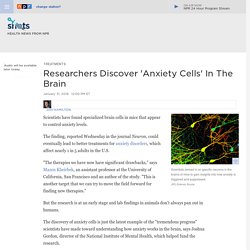
SPL/Science Source hide caption toggle caption SPL/Science Source. On Flipboard. New Gene Therapy Could Regenerate Brain Tissue, Fix Neurological Diseases. In Brief A new study has demonstrated a method of using stem cells to repopulate the brain's supply of immune cells.
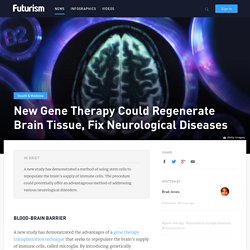
The procedure could potentially offer an advantageous method of addressing various neurological disorders. Blood-Brain Barrier A new study has demonstrated the advantages of a gene therapy transplantation technique that seeks to repopulate the brain’s supply of immune cells, called microglia. By introducing genetically engineered microglia into patients with neurodegenerative diseases, these cells could potentially regenerate brain tissue and even cure serious brain diseases. These cells are injected straight into the ventricles, the four brain cavities that produce cerebrospinal fluid, which allows them to take effect much faster. Alessandra Biffi, the director of the gene therapy program at Dana-Farber/Boston Children’s Cancer and Blood Disorders Center and leader of the study, has been looking at Lysosomal storage diseases (LSDs) for some time. Population Growth. Scientists Discover How The Brain Controls Ageing – And Manage To Slow It Down.
If you are reading this and you don’t smoke, then your major risk factor for dying is probably your age.
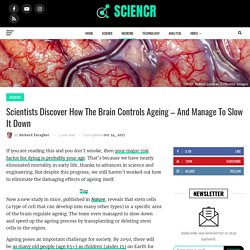
That’s because we have nearly eliminated mortality in early life, thanks to advances in science and engineering. But despite this progress, we still haven’t worked out how to eliminate the damaging effects of ageing itself. Now a new study in mice, published in Nature, reveals that stem cells (a type of cell that can develop into many other types) in a specific area of the brain regulate ageing. The team even managed to slow down and speed up the ageing process by transplanting or deleting stem cells in the region. Ageing poses an important challenge for society. The mechanisms that keep organisms healthy are relatively few in number and conserved between species, which means we can learn a lot about them by studying animals such as mice.
Jneurosci. Log In. Study: Psilocybin Mushrooms Can Help Cancer Anxiety. The doom hung like an anvil over her head.
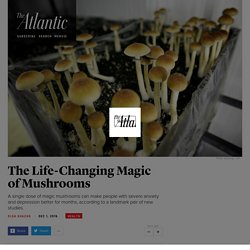
In 2012, a few years after Carol Vincent was diagnosed with non-Hodgkin lymphoma, she was waiting to see whether her cancer would progress enough to require chemotherapy or radiation. The disease had already done a number on her, inflating lymph nodes on her chin, collar bones, and groin. She battled her symptoms while running her own marketing business. To top it all off, she was going through menopause. “Life is just pointless stress, and then you die,” she thought. When one day at an intersection she mulled whether it would be so bad to get hit by a car, she realized her mental health was almost as depleted as her physical state. Anti-inflammatory drug gives hope of brain repair after stroke. According to the American Stroke Association, stroke is the fifth leading cause of death in the US and one of the leading causes of adult disability.
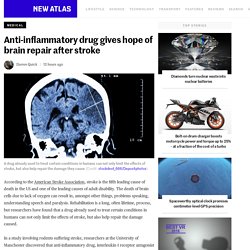
The death of brain cells due to lack of oxygen can result in, amongst other things, problems speaking, understanding speech and paralysis. Rehabilitation is a long, often lifetime, process, but researchers have found that a drug already used to treat certain conditions in humans can not only limit the effects of stroke, but also help repair the damage caused. This tiny brain parasite seems to make rodents braver—and it likes humans, too. You don’t have to watch Tom and Jerry cartoons to know that mice run away from cats.
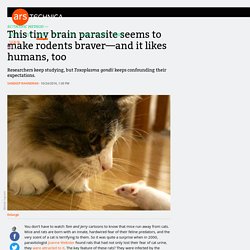
Mice and rats are born with an innate, hardwired fear of their feline predators, and the very scent of a cat is terrifying to them. So it was quite a surprise when in 2000, parasitologist Joanne Webster found rats that had not only lost their fear of cat urine, they were attracted to it. The key feature of these rats? They were infected by the parasite Toxoplasma gondii.
This phenomenon, which Webster dubbed “fatal feline attraction,” is particularly fascinating given the peculiarities of the parasite. Yet despite its ubiquity, Toxoplasma reproduces sexually only in cats. Not Just a State of Mind: Scientists Locate the Physical Source of Depression in the Brain. In Brief Major depressive disorder affects approximately 14.8 million American adults, or about 6.7 percent of the U.S. population age 18 and older, in a given year. Researchers have found that feelings of loss and low self-esteem are directly linked to two sides the OFC — the medial OFC and the lateral OFC. The War on Parkinson's: Stem Cells Successfully Injected into Patient's Brain. More Humane Doctors from the Royal Melbourne Hospital successfully injected stem cells onto the brain of a 64-year old Parkinson’s Disease patient. This operation, the first of its kind, marks a positive step towards developing better Parkinson’s treatment. Researcher Garish Nair, a neurosurgeon at Royal Melbourne, led the procedure.
23andMe Pulls Off Massive Crowdsourced Depression Study. A scientific expedition into the DNA of more than 450,000 customers of gene-testing company 23andMe has uncovered the first major trove of genetic clues to the cause of depression. The study, the largest of its kind, detected 15 regions of human genome linked to a higher risk of struggling with serious depression. The study was carried out by drug giant Pfizer as part of an alliance with 23andMe, the California company whose gene reports have been purchased by more than 1.2 million people (see "50 Smartest Companies 2016: 23andMe").
So far the vast majority of efforts to locate genetic risks for depression have failed, probably because the efforts have been too small to find anything. “Everyone is recognizing that this is a numbers problem,” says Ashley Winslow, formerly a neuroscientist at Pfizer and now the director of neurogenetics at the Orphan Disease Center at the University of Pennsylvania. Winslow led the research effort. Blood test that could be a breakthrough for people with depression. A new blood test could be a first step towards personalised treatment for depression, say scientists. The test accurately predicts whether or not patients will respond to common antidepressant drugs.
Around half of people with depression are not helped by "first-line" antidepressants and a third are resistant to all available drug treatments. Until now there has been no way of knowing in advance which patients will need more aggressive treatment, which might involve a combination of different drugs. Instead, most treatment for depression is conducted on a trial and error basis. Antidepressant Compound Located That May Come With Zero Side Effects. Ketamine is known to be able to reverse the symptoms of depression very quickly.
It has been shown to treat depression without a matter of hours. Most antidepressant medications take a number of weeks or months for results to be reached. Sadly, the drug comes with many major side effects, such as hallucinations or even dissociation. Your brain does not process information and it is not a computer.
Fixing broken brains: a new understanding of depression. (Image: Michael Glenwood) This Bionic Eye Could Cure Blindness. Just before Thanksgiving, Chicago-based accounting firm Crowe Horwath put out a video instructing employees on what to wear and what not to. The virus that could cure Parkinson’s, Alzheimer’s, and more — NOVA Next.
In 2004, the British chemist Chris Dobson speculated that there might be a universal elixir out there that could combat not just alpha-synuclein for Parkinson’s but the amyloids caused by many protein-misfolding diseases at once. Study Outlines Why Antidepressant Drugs Could Be Completely Useless & Harmful. This Startup Gets You High On Dopamine, No Exercise Required. All of the Fun, None of the Workout. Huffingtonpost. Cream – Audio and neuroscience. New Drug Therapy Could End Chronic Pain. Brain gets addicted to pain, but double-drug approach takes pain away. A brain region controlling whether we feel happy or sad, as well as addiction, is remodeled by chronic pain, reports a new Northwestern Medicine study.
Matrix-style memory prosthesis set to supercharge human brain. Human memory is about to get supercharged. Lack Of Deep Sleep May Set The Stage For Alzheimer's. Jeffrey Iliff (right) and Bill Rooney, brain scientists at Oregon Health & Science University, look over an MRI. Does speaking a second language really improve cognition? The idea that learning to speak two languages is good for your brain has come to be widely accept as fact, particularly in popular media. Scientists have discovered brain networks linked to intelligence for the first time. Matrix-style memory prosthesis set to supercharge human brain. Network theory sheds new light on origins of consciousness. Researchers Reprogram Genome to Produce More Dopamine. Scans prove there's no such thing as a 'male' or 'female' brain. Measuring Dopamine in Parkinsons Patient’s Gives Insight Into How We Learn.
Right Side of Brain Can Compensate for Loss of Speech Following a Stroke. Oxytocin Enhances Pleasure of Social Interactions by Stimulating Production of “Bliss Molecule” Scientists have found that memories may be passed down through generations in our DNA.
Neurosurgeon Emad Eskandar Thinks He Can Cure Complex Psychiatric Disorders Using Implanted Electrodes. Microglia Plays Crucial Role in Early Progression of Alzheimer’s Disease. Predicting change in the Alzheimer’s brain. A new factor in depression? Brain protein discovery could lead to better treatments: Study in humans and rats shows more physical changes in depressed brains. Depression: It’s Not Your Serotonin. It took 12 weeks to grow this tiny brain in a petri dish. It could revolutionize neuroscience. Scientist: Most complete human brain model to date is a ‘brain changer’
A bacteriophage capsid protein provides a general amyloid interaction motif (GAIM) that binds and remodels misfolded protein assemblies. Universal plaque-busting drug could treat various brain diseases. Special Brain Exercise ‘Enhances Brain Performance’, New Study Finds. Bionomics begins BNC210 Phase II clinical trial for treatment of anxiety, depression. What has neuroscience ever done for us? New Study Shows That Your Brain's Powers Change As You Age. Anesthesia points to deeper level 'quantum channels' as origins of consciousness.
Molecular inhibitor breaks cycle that leads to Alzheimer’s. New Pathways Discovered to Prevent Blindness. The Coming Boom In Brain Medicines. Anti Epilepsy Drug Preserves Brain Function After Stroke. Brain Hormone Improves Learning, Memory, And Wards Off Alzheimer's Disease. Serotonin Deficient Brains More Vulnerable to Social Stress. New Brain Decoder Could Boost Neuroscience Research. Memory & Learning Boosted and Depression Prevented By Compound In These Fruits and Nuts. A New Neural Circuit Controls Fear in the Brain. Do viruses make us smarter? Endogenous retroviruses in neural progenitor cells. Cracking the code of brain development. Brain inflammation a hallmark of autism, large-scale analysis shows. The Spice That Prevents Fluoride From Destroying Your Brain. Languages “Lost” In Infancy Discovered In The Brain. The Science of Sleep: Dreaming, Depression, and How REM Sleep Regulates Negative Emotions.
New Blood Test Could Diagnose Depression. New Blood Test Diagnoses Depression. Study offers evidence of unconscious thinking impacting conscious decision making. A rich vocabulary can protect against cognitive impairment. Scientists sniff out unexpected role for stem cells in the brain - ScienceBlog.com. A New Target for Personalized Brain Cancer Treatment. Neuroscience: Brains of Norway. Scientists Discover Strange New Brain Cell Shape. Big Brother Is Feeling You: The Global Impact Of AI-Driven Mental Health Care. MIT Neurotech: Journey Through the Brain. Direct Brain-To-Brain Communication Used in Humans.
Chattering brain cells hold the key to the language of the mind. Long-Held Belief About Depression Challenged by New Study. Scientists Successfully Reverse Emotions Associated With Memory. The secrets of the ‘little brain’ – what do we really know about the cerebellum? The Learning Myth: Why I'll Never Tell My Son He's Smart Losing Sleep. Brain Plasticity: How learning changes your brain. Rusty memories rejuvenated in elderly mice - health - 01 July 2012. Coming Soon: Brain Implant To Restore Memory. Study Reveals New Approach For Blocking Neuronal Damage From Stress. Harvard Scientists May Have Just Unlocked the Secret to Staying Young Forever. Scientists Selectively Erase And Restore Memories. Brain Waves Synchronize for Faster Learning.
Dr. Tania Singer and the Neuroscience of Empathy. Quadriplegic Man Uses Thoughts To Move His Limb. Researchers May Have Discovered The Consciousness On/Off Switch. DARPA Wants Brain Implants For Restoring Memories.